Avocado, a flexible and nutritious natural fruit, has found favor in the hand of chicken keepers because of its medical
advantages to humans and livestock. I know you will be wondering if it is safe to give your chicken this delicious treat.
Well, In this post we will investigate the question, "Can chickens eat avocado?" in this comprehensive guide, and provide
guide you with all the information you need to make an informed decision.
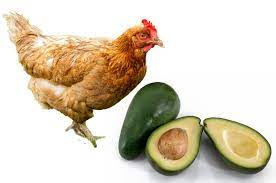
Nutritional Value of Avocado: Is it Suitable for Chickens?
Before we delve into whether chickens can consume avocado, let's take a closer look at its nutritional composition. Several
studies have shown that Avocados contain healthy fats, vitamins, and minerals, which make them an extra nutritious diet,
Although, some of the high-fat content of avocados may not be ideal.
Chickens have a specific dietary requirement that prioritizes protein and carbohydrates over fats. Avocados are also rich in essential nutrients like potassium, vitamin C, and
vitamin E. Recall, moderation is always key when trying a new treat for your chicken.
Also, Read: Can Chickens Eat Bananas? Nutritional And Health Benefits of Banana Peel
Potential Risks and Toxicity of Avocado for Chickens
Now, let's address the elephant in the room - the potential risks and toxicity of avocados for chickens. Avocado contains a
substance called persin, which can be toxic to various animals, including chickens. Persin is primarily found in the leaves,
bark, skin, and pit of the avocado fruit.
However, the concentration of persin in the flesh of the fruit is generally considered to
be low and not harmful to chickens when consumed in small amounts. It's important to note that different chicken breeds and
individual birds may react differently to avocados, so it's crucial to observe your flock closely when introducing any new food.
Avocado Parts to Avoid Feeding Chickens
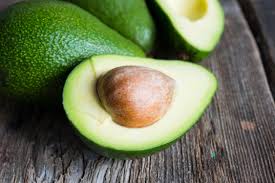
It is essential to know what parts of Avocado should be avoided. As mentioned earlier, the leaves, bark, skin, and pit contain
higher concentrations of persin and should never be fed to chickens.
These parts can lead to digestive issues and even be
fatal to your flock. Additionally, if you have an avocado tree in your yard, ensure that fallen leaves and fruit are promptly
removed from the chicken's vicinity. Safe Ways to Incorporate Avocado into Chicken Diet
There are safe ways to supplement avocado with your chicken diet while observing safety measures.
You can give ripe avocado flesh to your chicken as a treat, but it should be consumed in moderation and cut into manageable
chunks. By doing so you reduce the likelihood of choking or overeating.
Mixing small portions of avocado with your chickens' regular feed or using it as a training treat can add variety to their diet without compromising their health.
Read Also: What Chickens Lay Black Eggs?: All you need to know about Black Chicken eggs
Moderation is Key: Recommended Feeding Practices
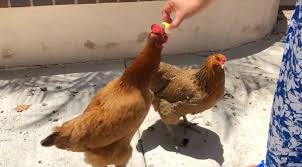
Likewise, with any new food, balance is vital with regard to treating avocados to chickens. Keep in mind that avocados should
only be enjoyed as a treat rather than as a regular part of the chicken diet. The prescribed rule is to give avocados as an
intermittent treat, something like on more than one occasion per month, depending on the size of your flock.
By following this practice, you ensure your chickens receive a balanced diet that meets their nutritional needs without
exposing them to excessive fats or potential toxicity.
Alternative Healthy Treats for Chickens
Irrespective of how nutritious avocado is, it is crucial you keep them clean and give them a variety of healthy treat to keep them happy and full.
Here are some alternative treats you can consider incorporating into their diet:
Fruits:
Besides avocado, Your chicken can also eat other fruits like berries, melons, apples, bananas, etc. These fruits are
rich in vitamins, minerals, and natural sugars that can be healthy for your chickens. In addition, you should remember to
remove any seeds or pits before offering fruits to your chickens.
Vegetables:
From my backyard chickens, fellow chicken keepers, and studies, chickens are found to enjoy leafy greens like spinach, kale,
and lettuce. Vegetables like carrots, cucumbers, and zucchini can be given as treats.
These vegetables are packed with nutrients and provide a crunchy texture that chickens love.
Grains:
Whole grains like oats, barley, and wheat can be given as occasional treats. They offer carbohydrates and fiber, providing
energy and aiding in digestion. Scatter some grains in their coop or run to encourage natural foraging behavior.
Mealworms:
Mealworms are a protein-packed snack that chickens adore. You can get them in your local stores in dried form and online
from pet supply stores. I use mealworms as a treat for chickens and as a good source of extra protein.
Yogurt:
Plain, unsweetened yogurt is not only a tasty treat for chickens but also a source of beneficial bacteria. The probiotics in
yogurt promote healthy digestion and can help maintain a balanced gut flora in your flock. Offer small amounts of yogurt as an
occasional treat.
Also read: What Chickens Lay Brown Egg? Here are the 11 Best Breeds...
Signs of Avocado Poisoning in Chickens:
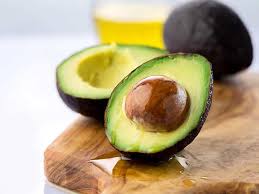
What to Watch Out For
Ensure you use avocados in a moderate form and also know the signs of excessive use of them to know when to withdraw.
In case your chickens consume large amounts of avocado or show symptoms of toxicity, immediate veterinary assistance should be sought. Some signs to watch out for include:
Difficulty breathing or gasping for air
Weakness or lethargy
Loss of appetite
Swollen or congested abdomen
Diarrhea or changes in droppings
Tremors or seizures
If you notice any of these symptoms, first you should is to isolate the affected chickens from the rest of the flock and seek professional veterinary advice.
In conclusion, chickens can eat avocado, but it should be done with caution and in moderation. While the flesh of the fruit is
generally safe for chickens, it's crucial to avoid feeding them the leaves, bark, skin, and pit due to their higher persin content.
By following recommended feeding practices, you can safely introduce avocados as an occasional treat, ensuring your
chickens receive a balanced diet while avoiding potential risks.
Note that the nutritional needs of your birds come first, thus you should vary the treat you offer to your bird from fruits,
vegetables, grains, mealworms, and yogurt. Offering these treats in moderation will not only add diversity to their diet but also
keep them happy and engaged.
Always monitor your chickens closely for any signs of avocado poisoning or adverse reactions to new foods. By staying
informed and making responsible decisions, you can ensure the well-being and health of your flock while occasionally treating
them to the delights of avocado.
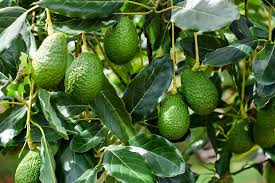
Frequently Asked Questions. (FAQs)
Can chickens eat avocado pits?
A: No, chickens should not consume avocado pits. The pits contain a higher concentration of persin, which can be toxic to
chickens. It's best to avoid feeding them any part of the avocado pit.
Q: Is it safe to feed chickens avocado leaves?
A: No, avocado leaves should not be given to chickens. They contain higher levels of persin, which can be harmful and
potentially fatal to chickens. It's important to keep avocado leaves away from your flock.
Q: How many avocados can I give my chickens?
A: Avocados should only be given to chickens in moderation. As a treat, offer small amounts of ripe avocado flesh, chopped
into manageable pieces. Avoid excessive consumption due to the high-fat content. It's recommended to provide avocados no
more than once or twice a month, depending on the size of your flock.
Q: What are the signs of avocado poisoning in chickens?
A: Signs of avocado poisoning in chickens can include difficulty breathing or gasping for air, weakness or lethargy, loss of
appetite, swollen or congested abdomen, diarrhea or changes in droppings, and tremors or seizures. If you notice any of
these symptoms, seek veterinary assistance immediately.
Q: Are there alternative treats I can give my chickens instead of avocado?
A: Absolutely! Chickens enjoy a variety of healthy treats. You can offer them fruits like berries, melons, apples, and bananas,
as well as vegetables such as spinach, kale, carrots, cucumbers, and zucchini. Grains like oats, barley, and wheat can be
scattered for natural foraging, and mealworms and plain yogurt can be given as protein-packed treats.
Q: Can chickens safely eat avocado peels?
A: It's best to avoid feeding chickens avocado peels. While the flesh of the fruit is generally safe, the peel can contain traces
of persin and may not be easily digestible for chickens. Stick to offering them the flesh of the avocado in small, manageable
pieces.
Q: Can all chicken breeds safely eat avocado?
A: While avocado is generally considered safe for most chicken breeds when given in moderation, individual birds may have
different reactions. It's important to observe your flock closely when introducing any new food, including avocado. Monitor
them for any signs of adverse reactions and adjust their diet accordingly.
Q: Can avocados improve the quality of eggs from chickens?
A: While avocados contain beneficial nutrients, there isn't sufficient evidence to suggest that feeding avocados directly
improves the quality of eggs from chickens. A balanced and nutritious diet overall, including a variety of feed and treats, will
contribute to healthier eggs.
Q: Can I feed my chickens avocado if they are free-ranging?
A: Even if your chickens are free-ranging, it's still important to exercise caution when feeding them avocados. While they may
have access to a varied diet, including insects and plants, avocados should only be given as occasional treats in controlled
amounts. Always prioritize their well-being and follow recommended feeding practices.
Need a website or other IT services? Visit our website!
Share on Twitter Share on Facebook
Comments
There are currently no comments
New Comment